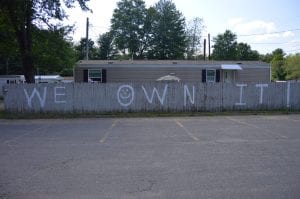
After the sale, a message was left on the fence at the front of Heritage Mobile Home Park. (Photo by Peter Currier)
WESTFIELD- Two mobile home communities have been collectively purchased by their residents this month after the owner put both of them up for sale.
The Arbor Mobile Home Park and the Heritage Mobile Home Park were sold to their residents on July 24 in a complicated sale that involved three parks in two states. The Heritage and Arbor Parks were owned by the same person alongside another mobile home park in Rhode Island. All three of the parks were put up for sale at the same time.
“The ultimate reason for Heritage to purchase our park was dissatisfaction towards the previous owner,” said Joanna Ramirez, the board secretary at Heritage. “It was mostly due to infrastructure improvements that are badly needed.”
The purchase of the three communities was done because the residents wanted to secure their affordable housing for the future. The total cost of the three communities between the residents was $6.9 million. Arbor alone cost $1.73 million while Heritage cost $1.79 million. All three were purchased as part of a single transaction. There are 187 total housing units across the three parks.
“The park was up for sale, and residents were anxious about large lot fee increases and other negative impacts that a new owner might bring,” said Ramirez.
Their anxiousness, combined with the opportunity to do something about it, led to the residents working to purchase the communities.
“The option for three residents’ groups in two states to purchase their communities in a single deal presented a unique challenge,” said Andy Danforth, CDI’s New England Resident Owned Communities (NEROC) program director. “This type of a deal has never been executed before. In all, we now support 49 converted communities in six states with close to 12,000 residents and over $200 million of program investment in the last nine years.”
The sale was organized by the Cooperative Development Institute (CDI) and Resident Owned Communities (ROC). CDI was responsible for organizing the communities with the proper committees and groups needed to run them. They coached the residents on how to run a small community. ROC’s main purpose was to organize the funding for the purchase and provide financing.
“These two communities have worked incredibly hard to achieve this goal and it has been an honor to work with them,” said Libby O’Flaherty, the cooperative housing specialist for CDI, “When members came together for the final vote to purchase, it was a unanimous yes in both communities and the excitement was palpable.”
On Sept. 10 at 1 p.m., there will be a celebration of the purchase at the former Rick’s Cafe at 868 Southampton Road. Ramirez said that they are attempting to get some local officials to attend.




